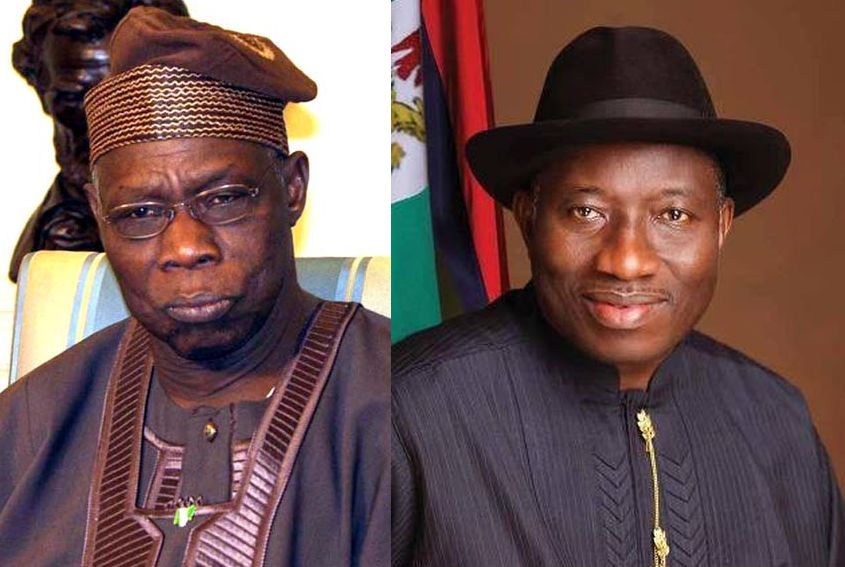By Mohammed Dahiru Aminu
Of course we may still be an amnesiac nation, but this is a national culture of memory loss that I am unwilling to be plagued by. Thus, I am not willing, to concede that in the entirety of things, Obasanjo’s government was better than the current; a bid that I am sure, dangerously renders and even imbues in Obasanjo a somewhat angelic (or even divine) excellence that Jonathan does not supposedly exhibit. I am unwilling to concede this assertion provided that the facts and the figures argue for Obasanjo.
Obasanjo came to power in 1999, and brought with him a Vice President whose proclivity for corruption Nigeria had never seen, at least in a person who occupied that office, past and present. Little wonder that Obasanjo’s choice of a VP was described by one of the famous northern emirs in the vilest of terms: an unmitigated disaster.
Talk about treasonable felonies and you get the following from Obasanjo: the genocides of Zaki Biam and Odi; Third Term Agenda; the electoral heists of 2003 and 2007, with 2007 being the worst, perhaps in the history of ballot politicking. There was the slaying of the nation’s agro sector in terms of budget allocation, such that the Ministry of Agriculture took a seat behind the Ministry of Women Affairs. This is not to mention the non payment of civil servant’s salaries, but where it was paid; a typical federal government establishment that had over a thousand or more employees got only an atrocious paltry sum as annual CAPEX.
Of course Jonathan’s greatest undoing is his government’s passivity towards the insurgency in the north, but a cursory study of the chronicles of Boko Haram show that the sect developed not only its shoots but also grew to full bloom under Obasanjo’s administration. Thus, while Jonathan is to blame for docility over Boko Haram, Obasanjo should be blamed for allowing all the necessary conditions for its breeding.
But Obasanjo’s greatest crimes were his endless financial frauds. Take out Siemens, Halliburton, etc, which spawned under his VPs’ watch, you’ll still be left with a myriad of others such as National ID card fraud, the missing 16–20 billion US dollars in power “reforms”, the contravention of section 147 of the Nigerian Constitution by illegitimately appointing himself Minister of Petroleum Resources, shrouding the activities of the lush industry in secrecy, and without rendering proper accounts of oil revenue to relevant agencies. Throughout Obasanjo’s horrid eight years in power, neither the Federal Executive Council nor the National Assembly was ever presented a budget of the oil industry.
What’s more? According to some reports, Nigeria lost over 130 billion US dollars of unaccounted revenue between 2000 and 2006, under Obasanjo. More so, more than 700 million dollars of oil revenue was misappropriated to enrich Obasanjo and his ruling PDP. In the case of the Kaduna refinery, Obasanjo spent over 200 million US dollars to “repair” it and then auctioned it at a paltry 106 million US dollars. Obasanjo was also said to have withdrawn 1 trillion naira from NNPC account as contained in a December 10, 2007 petition to the EFCC filed by the Conference of Nigerian Political Parties (CNPP).
Other references made by the CNPP were the many protests by then Chairman of the Revenue Mobilisation Allocation and Fiscal Commission (RMAFC), Hamman Tukur, on the spate of illegal withdrawals by the Obasanjo administration leading the RMAFC to sue the Obasanjo government over these withdrawals. Obasanjo was also said to have withdrawn 100 million dollars from the Federation Account illegally to cover the obligations of the Investors International Limited (IIL) of London to First Bank Plc. The company which is believed to be owned by some Obasanjo cronies borrowed the sum of 100 million US dollars to enable it make up its 10 percent down payment for the price of NITEL. However this loan to IIL was illegal as it contravened the Bank and Other Financial Institutions Act (BOFIA) of 1991. The Act declares that a bank cannot give a loan to a single client in excess of 35 percent of the value of its shareholders fund.
These are just a few of the many sins of Obasanjo.
M. D. Aminu (mohd.aminu@gmail.com) wrote from Abuja, Nigeria.



